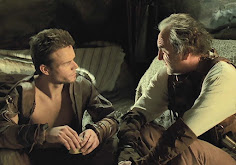It moves at a faster pace than Part II and makes a more effective story. But the failures of Part II haunt it.
I suspect one reason is that unhappy/conflicted prophets are difficult to portray.
I argue elsewhere that religious conviction, of whatever type, is difficult to write about. Far too often, this difficulty is blamed on Hollywood agnosticism or antipathy to religion. This is an unfair argument since (1) religious practice and beliefs are far more prevalent/influential in American life than pro and anti arguments encapsulate; (2) even devotedly religious people kind of stink at writing about religious conviction.

At a calmer, more mundane level than Dune, Anne Tyler's Saint Maybe does a fairly good job of capturing the main character's uncertainty, his guilt, about his beliefs as well as the sect that he joins. There's a great conversation between him and the sect's leader in which the leader admits ruefully to doing the best he can when he declares the congregation should do X or Y. What will bring us together and reflect a common belief system this time?
Paul's troubles as a prophet begin directly after Leto dies. The 1984 movie ignores this path; the miniseries moves it into Part III and it seems abrupt and contrived rather than organic. He is closer to book Paul yet disconnected from Parts I & II Paul.
Again, Herbert knew what he was doing. I've read none of his other books, but Dune the novel earned its reputation. It's well-written and organized and scriptwriters should take it seriously as a source.
In fairness, visuals are different from words. As a possible solution, I would have moved up Paul's ride on the maker/sandworm to take place at the end of Part II (since the miniseries was unwilling to spend more time on Jessica's arc). The act would protect his position within the Fremen as he came to terms with his larger role. Part III would then lead up to the final, ruthless, and terrifying decision by Paul to hold the spice hostage. (I figured out the impact of withholding spice, by the way, without any creepy navigator scenes.)
 |
| The final duel is effectively done. |
But perhaps there is no "best" solution. Despite its flaws, Part III of the miniseries is quite gripping. But would it have worked without Part II? Without even a weak Part II?
Perhaps the problem is that world/universe fantasy/sci-fi is difficult in general to put on film. Lucas was writing space opera and should never have tried to make it something that made sense politically. Herbert wrote political fiction. Maybe it can't be translated.



No comments:
Post a Comment